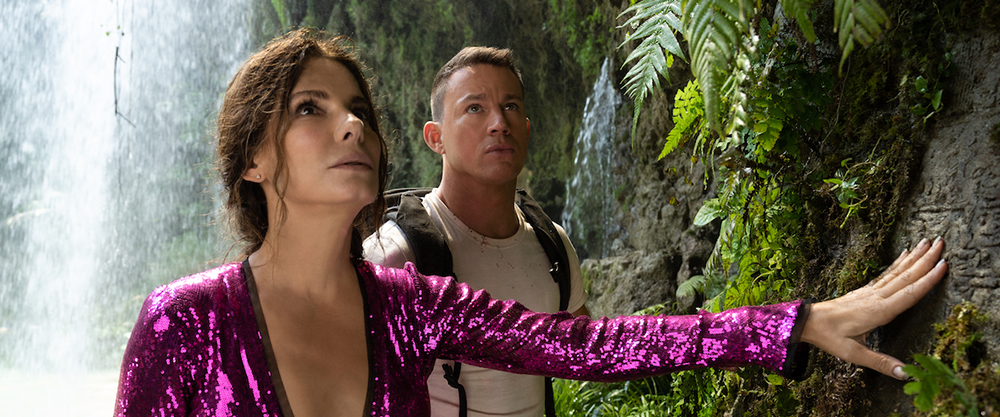Last weekend, I was at the Time Warp Drive-In for the screening of the classic Indiana Jones trilogy. Yes, there was lots of stuff to do around town on Saturday night, and I’ve seen Raiders of the Lost Ark hundreds of times, but I just couldn’t resist the rare opportunity to watch a masterpiece of adventure cinema at the drive-in. As Harrison Ford and Alfred Molina skulked through the booby-trapped Peruvian temple, I glanced over to Malco Summer Drive-In’s screen three, where I saw Sandra Bullock and Channing Tatum in an overgrown jungle temple, surrounded by snakes, lorded over by a guy in a fedora who looked a lot like Indy’s arch enemy Belloq. The movie was The Lost City, and its existence in 2022 speaks to the enduring influence of George Lucas and Steven Spielberg’s collaboration in the early 1980s.
The dashing archeologist/adventurer Indiana Jones has deep roots in the pulp literature of the early 20th century, where characters like Doc Savage and Allan Quatermain were both scholars and two-fisted men of action who traveled to exotic locales to find treasure and thwart the plans of other well-educated, but evil, Westerners. Lucas encountered these hyper-competent heroes in films like 1937’s King Solomon’s Mines and the adventure serials which ruled the Saturday matinee. You can still see those kinds of heroes get out of unlikely scrapes, most recently in Uncharted.

Almost as soon as Spielberg set the new template for the colonial adventure tale, people started parodying it.
The earliest light ribbing of Indiana Jones was Romancing the Stone, Robert Zemeckis’ 1984 romantic comedy starring Kathleen Turner as Joan Wilder, a romance novelist thrust into an adventure right out of one of her books, and Michael Douglas as a rakish big-game hunter who comes to her rescue. In The Lost City, Sandra Bullock’s Loretta Sage is the direct descendant of Joan Wilder. She’s the author of a highly profitable series of books about extremely sexy hero Dash and his on-again, off-again archeologist love interest Angela Lovemore. Loretta can’t come up with a good end for her latest romantic escapade, in which the couple searches for the legendary Lost City of D, and her publishing company publicist Beth (Da’Vine Joy Randolph) is increasingly agitated about it. When she finally gives up and tacks on a stupid ending, she finds herself thrust into a book tour opposite Alan (Channing Tatum), the hunky model who lends his image to Dash for her book covers.
As with all good rom-coms, we know they’re destined to get together long before they do. Just as the book tour is falling to pieces, Loretta is kidnapped by Abigail Fairfax (Daniel Radcliffe), the embittered scion of a Murdoch-esque publishing fortune who spends his ample free time and disposable income treasure hunting. The mysterious artifact Loretta used as the MacGuffin for her latest novel, the Crown of Fire, is real, and it turns out that, in researching her book, she came closer to discovering its final resting place than anyone in history. Fairfax whisks her away to the island where the crown is allegedly located to help finish his search. Meanwhile, a frantic Beth convinces Alan to contact his old friend Jack Trainer (Brad Pitt), a former Navy Seal who promises to return with Loretta in 48 hours “or your next rescue is free.”
Directed by brothers Aaron and Adam Nee, The Lost City is not breaking any new ground, but it’s a pretty tight little film which does exactly what it sets out to do. It succeeds based mostly on the chemistry between Bullock and Tatum, never missing an opportunity to wedge them into a cramped sleeping bag or confront Bullock with Tatum’s bare bum. It’s a given that the intellectual Loretta will eventually fall for the big-hearted, thick-headed himbo. The supporting cast is all in on the joke. Pitt once again proves he’s a character actor trapped in a leading man’s body. Radcliffe steals scenes as the civilized villain whose luxury MRAP has a mini-bar. Randolph carries her own comic B-plot almost single-handedly. The self-referential script, like its protagonist, is often too smart for its own good. Ultimately, it’s very refreshing to see a lighthearted romantic adventure where the stakes are human-sized. Sure, it’s derivative, but as Radcliffe’s villain says when he knocks Bullock out with chloroform, “It’s a cliché for a reason.”
The Lost City
Now playing
Multiple locations
